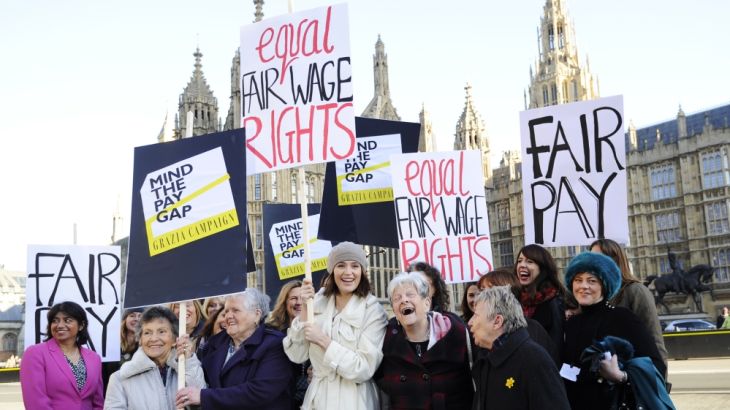
What will it take to close Britain’s gender pay gap?
Pay data from over 10,000 organisations show that on average men are paid more than women at most UK firms.
This past week, all companies with more than 250 employees in the UK were required to file their figures to the UK gender pay gap service, which allows employees to check their company’s record. The aim is to force employers to look at the barriers facing women in the workplace.
The so-called “gender pay gap” has revealed huge disparities in pay between the sexes, with 80 percent of companies and public sector bodies operating in Britain often paying men more than women, reports Al Jazeera’s Neave Barker from London.
Keep reading
list of 4 itemsWhen will EVs become mainstream in the US?
Key takeaways from Xi Jinping’s European tour to France, Serbia and Hungary
Air Vanuatu goes into liquidation, thousands of passengers stranded
However, “It’s not all down to gender discrimination,” says Wendy Olsen, professor of socioeconomics and head of the Department of Social Statistics at the University of Manchester. “There’s also the fact of occupational segregation”.
“So you might be well paid in the job that you’re in, but you might have left a better job for having a child and this is very gendered. So, if there are work stereotypes around caring for children, then it’s very likely we’ll keep having this gender difference in pay,” says Olsen.
I have no doubt there's discrimination in the UK but to start from the assumption that any gender pay gap is discrimination is unhelpful.
Julian Jessop, the chief economist at the Institute of Economic Affairs, strongly opposes the reporting measures, calling the data “inaccurately reported”.
“We often read that men are paid differently from women as if they’re paid differently for doing the same job when in fact it’s other differences – for example, whether they’re working full time or part time or the type of occupation that they’re doing. So the data is misrepresented,” says Jessop.
“One of the biggest and most important differences is between full time versus part time incomes, which isn’t reflected in these data at all,” explains Jessop. “Even if we do find out that men are overrepresented in some occupations rather than others, there isn’t necessarily evidence of discrimination. It’s certainly not evidence that people are being paid differently for doing the same job.”
“There may be a whole host of reasons why men and women choose or end up in different professions, which have nothing to do with discrimination and certainly have nothing to do with the fault of employers,” says Jessop. “But many employers are being demonised – those companies with large gender pay gap in favour of men are being described as the worst performers or being named and shamed, which I don’t think is the right approach at all.”
According to Jessop there’s “no doubt there’s discrimination in the UK, but to start from the assumption that any gender pay gap is discrimination is unhelpful … What we want companies to do is to have a long-term plan to improve these numbers over the next 5-10 years.”
Also on this episode of Counting the Cost:
Ethical cobalt: There’s a first attempt to ensure cobalt mined in the Democratic Republic of Congo is ethical. Cobalt is a key raw material in electric batteries, which are likely to drive the future of automation. Lithium-ion batteries also power smartphones. So prices have soared over 200 percent in the past five years. But most of the resource is mined in dangerous conditions in the Congo. The Congo is home to 60 percent of the world’s cobalt and some mines were found to employ children.
Counting the Cost talks to Nicholas Garrett, the executive director and cofounder of RCS Global, a UK supply-chain audit company in charge of implementing the first ever pilot scheme to produce “ethical cobalt” from Congo.
US-China trade war fears: China imposed tariffs on 128 US goods on April 2. The move is a retaliation for tariffs President Donald Trump announced on Chinese aluminium and steel recently. Adrian Brown reports from Beijing on the escalating US-China trade spat and what it could mean for both economies.
Facebook data breach: Facebook has said that up to 87 million of its users may have had their data accessed in the Cambridge Analytica scandal, almost double the number previously reported. Chief executive Mark Zuckerberg says he won’t step down because of the scandal and no one at the company has been fired, as Alan Fisher reports.
Spotify: The world’s largest music streaming company, Spotify is changing. As of this week, it’s now a publicly owned company. Spotify knows what we listen to and when and it wants to make money from that knowledge. Although it has never turned a profit, it’s changing how the music industry works. Rob Reynolds reports from Los Angeles.